初中英语语法专题讲座10——形容词
- 格式:doc
- 大小:62.50 KB
- 文档页数:6

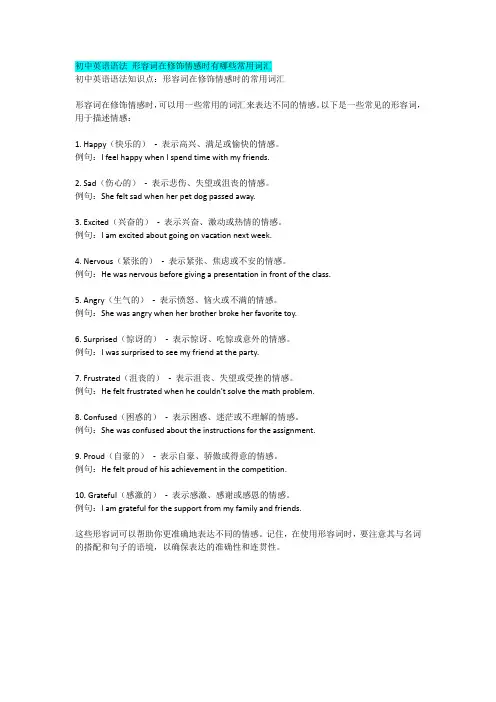
初中英语语法形容词在修饰情感时有哪些常用词汇初中英语语法知识点:形容词在修饰情感时的常用词汇形容词在修饰情感时,可以用一些常用的词汇来表达不同的情感。
以下是一些常见的形容词,用于描述情感:1. Happy(快乐的)-表示高兴、满足或愉快的情感。
例句:I feel happy when I spend time with my friends.2. Sad(伤心的)-表示悲伤、失望或沮丧的情感。
例句:She felt sad when her pet dog passed away.3. Excited(兴奋的)-表示兴奋、激动或热情的情感。
例句:I am excited about going on vacation next week.4. Nervous(紧张的)-表示紧张、焦虑或不安的情感。
例句:He was nervous before giving a presentation in front of the class.5. Angry(生气的)-表示愤怒、恼火或不满的情感。
例句:She was angry when her brother broke her favorite toy.6. Surprised(惊讶的)-表示惊讶、吃惊或意外的情感。
例句:I was surprised to see my friend at the party.7. Frustrated(沮丧的)-表示沮丧、失望或受挫的情感。
例句:He felt frustrated when he couldn't solve the math problem.8. Confused(困惑的)-表示困惑、迷茫或不理解的情感。
例句:She was confused about the instructions for the assignment.9. Proud(自豪的)-表示自豪、骄傲或得意的情感。
例句:He felt proud of his achievement in the competition.10. Grateful(感激的)-表示感激、感谢或感恩的情感。
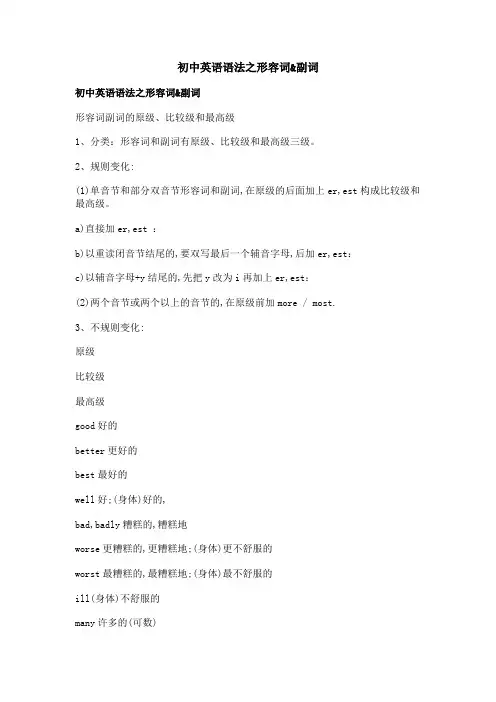
初中英语语法之形容词&副词初中英语语法之形容词&副词形容词副词的原级、比较级和最高级1、分类:形容词和副词有原级、比较级和最高级三级。
2、规则变化:(1)单音节和部分双音节形容词和副词,在原级的后面加上er,est构成比较级和最高级。
a)直接加er,est :b)以重读闭音节结尾的,要双写最后一个辅音字母,后加er,est:c)以辅音字母+y结尾的,先把y改为i再加上er,est:(2)两个音节或两个以上的音节的,在原级前加more / most.3、不规则变化:原级比较级最高级good好的better更好的best最好的well好;(身体)好的,bad,badly糟糕的,糟糕地worse更糟糕的,更糟糕地;(身体)更不舒服的worst最糟糕的,最糟糕地;(身体)最不舒服的ill(身体)不舒服的many许多的(可数)more更多的;更most最多的;最much许多的(不可数);非常little少的less更少的least最少的far远的;远地farther更远的;更远地farthest最远的;最远地further进一步的(地)furthest最深刻的(地)4、形容词和副词的原级、比较级和最高级的用法:(1) 讲述某人/物自身的情况时,用原级。
基本句型是:主语(sb./sth) + 谓语动词+(very/too/so/quite/rather…) + 形容词/副词原级+….如:He is very oldnow. 他现在很老了。
They ran quitefast. 它们跑得相当快。
The weatherlooks rather bad. 天气看上去相当糟。
I am sohappy! 我是如此的快乐!☆表示两者之间没有差别时,使用句型:主语(第一个人物) + 谓语动词 + as + 形容词/副词原级 + as + 第二个人物+….如He is as excited as his younger sister. 他和他妹妹一样兴奋。
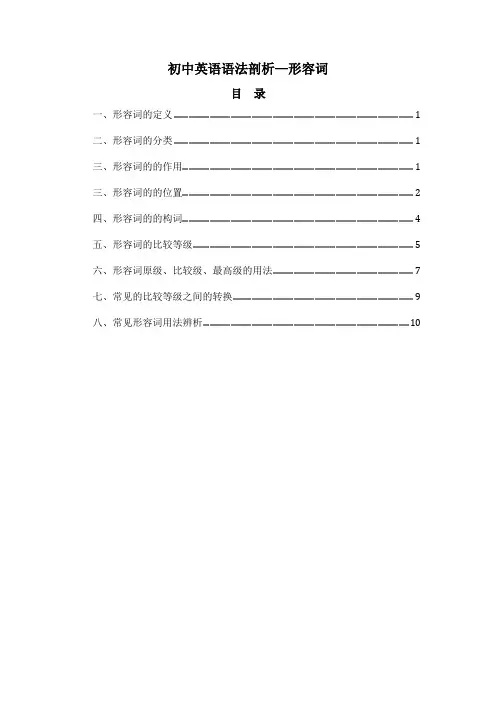
初中英语语法剖析—形容词目录一、形容词的定义 (1)二、形容词的分类 (1)三、形容词的的作用 (1)三、形容词的的位置 (2)四、形容词的的构词 (4)五、形容词的比较等级 (5)六、形容词原级、比较级、最高级的用法 (7)七、常见的比较等级之间的转换 (9)八、常见形容词用法辨析 (10)初中英语语法—形容词一、形容词的定义用来修饰名词或者部分代词的词。
形容词一般翻译成“……的”。
eg:他是一个漂亮的女孩。
(形容词修饰名词)(形容词修饰代词)二、形容词的分类三、形容词的的作用(1)作表语。
形容词常常用在连系动词be, look, get, become, feel, taste, smell, seem, sound等后面作表语,构成“主—系—表”结构。
❶放在状态系动词(Be动词)之后。
eg:The bike is expensive.这俩自行车很贵。
I am busy now.我现在很忙❷ 放在持续系动词之后。
eg:You must keep warm. 你一定要保暖。
He always stays happy in class. 他总是在课堂上保持快乐。
❸ 放在像系动词之后。
eg:He looks polite.他看起来很有礼貌。
He seems very sad. 他看起来很伤心。
❹ 放在感官系动词之后。
eg:The scarf feels soft.这条围巾感觉柔软。
This flower smells nice. 这朵花闻起来很香。
❺放在变化系动词之后。
eg:The leaves turn green. 叶子变绿了。
The egg becomes bigger.鸡蛋变得更大了。
(2)作定语。
形容词常常用在名词的前面,用于修饰名词(中心词)。
eg:She is a good student.她是一个好学生。
I have an old friend.我有一个老朋友。
She is a beautiful girl. 她是一个漂亮的女孩。

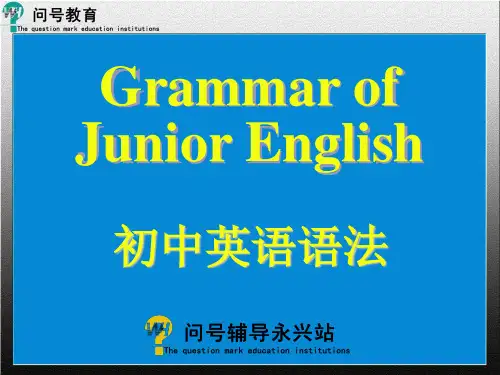
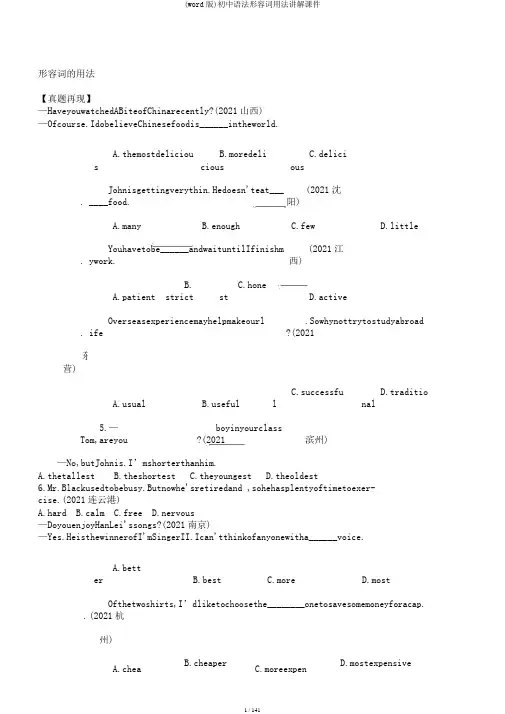
形容词的用法【真题再现】—HaveyouwatchedABiteofChinarecently?(2021山西) —Ofcourse.IdobelieveChinesefoodis______intheworld.A.themostdeliciou sB.moredeliciousC.delicious.Johnisgettingverythin.Hedoesn'teat_______food.(2021沈阳)A.manyB.enoughC.fewD.little.Youhavetobe______andwaituntilIfinishmywork.(2021江西)A.patientB.strictC.honest D.active.Overseasexperiencemayhelpmakeourlife.Sowhynottrytostudyabroad?(2021东营)ualefulC.successfulD.traditional5.—Tom,areyouboyinyourclass?(2021滨州)—No,butJohnis.I’mshorterthanhim.A.thetallestB.theshortestC.theyoungestD.theoldest6.Mr.Blackusedtobebusy.Butnowhe'sretiredand ,sohehasplentyoftimetoexer- cise.(2021连云港)A.hardB.calmC.freeD.nervous—DoyouenjoyHanLei'ssongs?(2021南京)—Yes.HeisthewinnerofI'mSingerII.Ican'tthinkofanyonewitha______voice.A.better B.best C.more D.most8 .Ofthetwoshirts,I’dliketochoosethe________onetosavesomemoneyforacap.(2021杭州)A.cheaB.cheaperC.moreexpenD.mostexpensivepest sive9.How________Cindygrows!She'salmostastallashermothernow.(2021河北)A.cuteB.strongC.fast D.straight10.—I’llnotbeJack ’sfriend.any(2021more荆州)—Don’tbeangry.He’sjustso,butinfacthe’sgoodtous,youknow.A.hel pfulB.directC.polite D.brave1 1.—Howdoyoulikethishouse?(2021兰州)—_______It’severythingI’vebeenlookingfor.A.Terrible!B.Perfect!C.Awful!D.Delicious!12.Mom,I’mvery_________forallyourlove.(2021河北)A. thankfulB. carefulC. usefulD. helpful13.Apersonwhois__________doesnottellliesorcheatpeople.(2021温州)A.carelessB.stupidC.honestD.humorous—Thescarvesareall beautiful.Ican’tdecidewhichonetochoose.(2021南昌) —Oh,lookatthisredone.Ithinkit’s______.A.beautifulB.morebeautifulC.themostbeautifulD.lessbeautiful15.Lisawasstillveryweakwhenshelefthospital.Butafteraweek’srest,shefeltmuch______andwentbacktoschool.(2021南京)A.good B.better C.bad D.worse16.—Don’tyouthinkit_________ofsometeenagerstobecrazyaboutpopstars?(2021常州)—Well,Idon’tthinkso.Wewereonceyoungandhadthesimilarexperiences.A.creativeB.sillyC.wiseD.curious17.—Haveyouheardthenewsofthetrafficaccident?(2021西宁)—Yes,manypeoplehavelosttheirlivesandthesituationisbecoming_______.Wehavedonemuchtoprotecttheenvironment.Sotheriverisgetting_________thanbefore.(2021陕西)1.19.Hehas_________armsnowandisabletopickthetableupwithonehand. (2021重庆)Boysandgirls,believeinyourselves.The________youare,thebettergradesyou’llget.(2021哈尔滨)A.morecareful B.morecarefully C.mostcarefully【答案与解析】句意:——你最近看?舌尖上的中国?了吗?——当然。
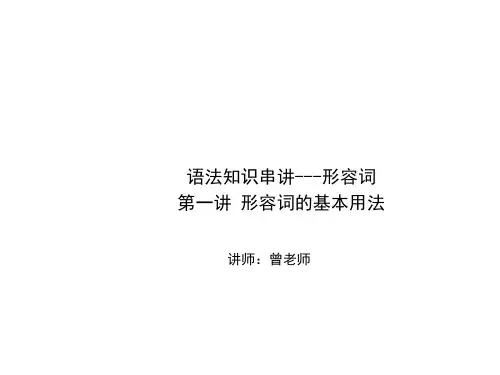

教学内容形容词和副词知识结构形容词一、形容词的定义形容词是描述人或事物的特征、性质、属性及状态的一种词类,主要用来修饰名词或代词。
二、形容词的句法功能成分说明例句作定语一般放在所修饰词的前面It’s a cold and windy day today. 今天是个寒冷、有风的天气。
1)表示发生时间的副词:►It’s beginning to rain now! 现在开始下雨了!2)表示频繁程度的副词,也称频度副词always, often, usually, sometimes, never, ever, hardly等一般位于系动词、情态动词和助动词之后,实义动词之前。
►She often changes her mind. 她常改变主意。
3)还有一些其他表示时间的副词:►He has just had an operation. 他刚动过手术。
2. 地点副词:here, there, out, somewhere, abroad, home1)有不少表示地点的副词:►She is studying abroad. 她在国外留学。
2)还有一些部分与介词同形的副词。
它们与介词同形,后跟宾语的是介词,否则是副词:①用作介词:Stand up!起立!①用作副词:A cat climbed up the tree. 猫爬上了树。
3)以where构成的副词也是地点副词:It’s the same everywhere. 到处都一样。
3. 方式副词:well, fast, slowly, carefully, quickly1)英语中有大量方式副词,说明行为方式(回答how的问题):►How beautifully your wife dances. 你夫人舞跳得真美。
2)还有相当多的副词,表示某些情绪:►She smiled gratefully. 她感激的笑了笑。
3)还有一些以-ly结尾的副词,表示动作发生的状况:►He left the town secretly. 他悄然离开了这座城市。

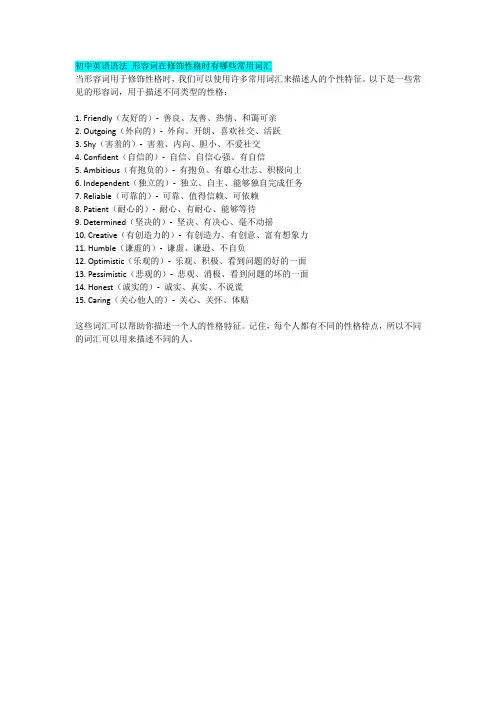
初中英语语法形容词在修饰性格时有哪些常用词汇
当形容词用于修饰性格时,我们可以使用许多常用词汇来描述人的个性特征。
以下是一些常见的形容词,用于描述不同类型的性格:
1. Friendly(友好的)-善良、友善、热情、和蔼可亲
2. Outgoing(外向的)-外向、开朗、喜欢社交、活跃
3. Shy(害羞的)-害羞、内向、胆小、不爱社交
4. Confident(自信的)-自信、自信心强、有自信
5. Ambitious(有抱负的)-有抱负、有雄心壮志、积极向上
6. Independent(独立的)-独立、自主、能够独自完成任务
7. Reliable(可靠的)-可靠、值得信赖、可依赖
8. Patient(耐心的)-耐心、有耐心、能够等待
9. Determined(坚决的)-坚决、有决心、毫不动摇
10. Creative(有创造力的)-有创造力、有创意、富有想象力
11. Humble(谦虚的)-谦虚、谦逊、不自负
12. Optimistic(乐观的)-乐观、积极、看到问题的好的一面
13. Pessimistic(悲观的)-悲观、消极、看到问题的坏的一面
14. Honest(诚实的)-诚实、真实、不说谎
15. Caring(关心他人的)-关心、关怀、体贴
这些词汇可以帮助你描述一个人的性格特征。
记住,每个人都有不同的性格特点,所以不同的词汇可以用来描述不同的人。
初中英语语法形容词在修饰质地时有哪些常用词汇初中英语语法知识点:形容词在修饰质地时的常用词汇在初中英语中,形容词常常用来描述事物的质地。
通过使用适当的形容词,我们可以更准确地表达事物的特征和特性。
下面是一些常用的形容词,用来描述事物的质地。
1. Soft(柔软的):指物体表面光滑、容易弯曲的特性。
例句:The pillow is soft and comfortable.这个枕头柔软舒适。
2. Hard(硬的):指物体坚硬、不易弯曲的特性。
例句:The table is made of hard wood.这张桌子是用硬木制成的。
3. Smooth(光滑的):指物体表面平整、没有凹凸的特性。
例句:The pebble is smooth and shiny.这个小石子光滑而有光泽。
4. Rough(粗糙的):指物体表面不平整、有纹理或凹凸不平的特性。
例句:The wall has a rough texture.这面墙有粗糙的质地。
5. Coarse(粗糙的):与rough类似,指物体表面不平整、有颗粒或纤维的特性。
例句:The sandpaper has a coarse texture.这个砂纸有粗糙的质地。
6. Smooth(光滑的):指物体表面平整、没有凹凸的特性。
例句:The silk fabric feels smooth to the touch.这种丝绸面料触感光滑。
7. Silky(丝绸般的):指物体质地像丝绸一样柔软、光滑。
例句:The puppy's fur is silky and shiny.小狗的毛发柔软光滑。
8. Fuzzy(绒毛的):指物体表面有绒毛或绒毛状的特性。
例句:The peach has a fuzzy skin.这个桃子有绒毛状的皮肤。
9. Sticky(粘性的):指物体表面具有黏性或粘附的特性。
例句:The glue is sticky and hard to remove.这个胶水粘性很大,很难清除。
初中英语语法---形容词和副词用法讲解命题趋势:形容词的比较级是近几年中考命题的热点之一,占中考题的百分之九以上,近几年中考试题主要考查形容词在句中作表语,后置定语和宾语补足语的用法。
比较级的一些不规律的情况及一些固定句型也尤为重要,比较级和最高级在特定的语言环境中的选用也是重点考查内容。
考点一、形容词的定义及句法功能形容词是用来描写或修饰名词(或代词)的一类词。
形容词在句中主要用作定语、表语和宾语补足语。
1.用作定语,修饰名词或代词。
(1)形容词修饰名词时,一般置于它所修饰的名词之前;如有若干形容词同时修饰一个名词时,它们的排列顺序较为固定,通常为:描绘形容词—特征形容词--(包括大小、长短、形状、新旧、年龄等)--颜色形容词。
例如:She has beautiful long curly blond hair.她长着漂亮的金黄色长卷发。
Mary gave me a useful big brown wooden box.玛丽给我一个实用的大的褐色木盒子。
注意:A.enough修饰名词时,既可以放在名词之前,也可以放在名词之后。
但多放在名词前。
例如:Don’t worry, we have enough time/time enough to get there.别着急,我们有足够的时间赶到那儿。
B.由连字符连接起来的复合形容词中的名词只能用单数形式。
例如:an eight-year-old boy 一个8岁的男孩(2)形容词修饰由some,any,every,no等构成的复合不定代词时,需后置。
例如:Will you please tell us something interesting?你给我们说一些有趣的事好吗?There’s nothing special in the box.盒子里没有什么特别的东西。
Anyone intelligent can do it.任何有智力的人都能做这件事。
初中英语语法专题讲座——形容词 【复习要点】 一、形容词的基本用法: 形容词是用来修饰名词或代词的,在句中可用作定语、表语和宾语补足语等。 ⑴ 用作前置定语,即放在名词前修饰该名词。例如:China is a great country with a long history. 中国是一个历史悠久的国家。 ⑵ 用作后置定语。形容词修饰不定代词或形容词短语修饰名词时,需要后置。例如:He has something important to tell you.他有重要的事告诉你。She is a girl good at singing. 她是一位擅长唱歌的女孩。 ⑶ 用作表语。例如:It was rainy yesterday, but today it is sunny. 昨天下雨,今天天晴。Your mother seems angry. 你母亲看上去生气了。The milk in the glass has gone bad. 玻璃杯里的牛奶发臭了。The leaves turn yellow in autumn. 树叶在秋天变黄。 注意: 有一些形容词在句中只能用作表语,我们称之为“表语形容词”。初中英语中常见的表语形容词有:afraid, alive, alone, asleep, glad, ill (生病的), ready, sorry, sure, unable, well (健康的)等。例如:I’m sorry not to have been ready for the party. 很抱歉,晚会我还没有准备好。The children were asleep just now, but now they’re awake. 孩子们刚才在睡觉,现在醒了。They were unable to help us. 他们没法帮助我们。 ⑷ 用作宾语补足语。例如:The news made her happy. 那个消息使她很开心。Who left the door open? 是谁没把门关上? 二、名词化的形容词: “the+形容词”具有名词的功能,泛指一类人或抽象事物。用作主语时,谓语动词要用复数。可以这样用的形容词有:blind, dead, old, poor, rich, young等。例如:The young are the hope of the country. 年轻人是国家的希望。The rich are not always happy. 有钱人并不总是快乐。 三、形容词的比较等级: 1. 比较等级的构成: 形容词比较等级分为原级、比较级和最高级三种。比较级和最高级的构成有规则变化和不规则变化两种。规则变化由“原级+-er”构成比较级、“原级+-est”构成最高级,如:small – smaller – smallest;
形容词比较级的构成规则: ①.单音节和部分双音节形容词或副词通常加后缀–er和–est构成比较级和最高级。如:long →longer →longest ②.原级以字母e结尾,则只加-r和-st;如: large →larger →largest ③.原级以“辅音字母+y”结尾,则应将y改为i,再加-er和-est构成比较级和最高级;如:busy →busier →busiest ④.原级为重读闭音节结尾,且末尾只有一个辅音字母,则双写这个辅音字母后再加词尾-er和-est构成比较级和最高级。如:big→ bigger→ biggest ⑤.多音节和部分双音节形容词在其前加more和most构成比较级和最高级。如:useful →more useful →most useful difficult →more difficult →most difficult ⑥.比较级和最高级的不规则变化如下表: 原级 比较级 最高级 bad/badly/ ill(有病的) worse worst
far farther further farthest(指距离) furthest(“抽象”的远) good/well better best little less least many/much more most
old older elder oldest(强调年龄,指人、物) eldest(强调长幼,只指人)
说明: ⑴ farther / farthest和further / furthest作为形容词都可以指距离。例如:The village was father / further than the bridge. 那个村子比那座桥更远。What is the farthest / furthest place you’ve ever been to? 你最远去过哪里? further可以用来修饰抽象名词,表示“进一步的;更多的”。例如:a college of further education 继续教育学院;进修学院He will need further help. 他将需要进一步的帮助。 ⑵ elder / eldest只用于人,表示兄弟姐妹间的长幼(排行)。elder指“(年纪)较大的”,eldest指“(年纪)最大的”。elder不与than连用。例如:He is my elder brother. 他是我的哥哥。(比较:my younger brother 我的弟弟)She is my eldest daughter. 她是我的长女。(比较:my youngest daughter 我最小的女儿) 2. 比较等级的基本用法: 形容词和副词都有比较等级的用法,以下内容含有对副词比较等级的介绍。 ⑴ 原级用于两者之间进行平级比较,其结构是“A is as…as B.”,意思是“A和B一样…”。例如:Mary is as tall as her sister. 玛丽和她姐姐个子一样高。He can speaks English as well as an Englishman. 他英语说得跟英国人一样好。She can read twice as fast as he does. 她阅读速度比他快一倍。 该结构的否定式为“A is not as / so… as B.”,意思是“A不如B那样……”。not as…多用于口语,not so… 多用于书面语。例如:This room is not as bright as that one. 这间房间没有那间房间亮。It is not so hot today as it was yesterday. 今天不如昨天热。He doesn’t work as hard as me. (= … as hard as I do.) 他工作不及我努力。 ⑵ 比较级用于两者之间进行比较并且其中一者在程度上超过另一者,其结构是“A is -er than B.”,意思是“A比B更……”。例如:The sun is bigger than the earth. 太阳比地球大。My room is smaller than yours. 我的房间比你的小。The houses here are higher than the ones over there. 这边的楼房比那边的楼房高。 ⑶ 最高级用于三者或三者以上之间进行比较并且其中一者程度最甚,其结构是“A is the -est of / in….”,意思是“A在其中最……”。形容词最高级前要用定冠词the。例如:The earth is bigger than the moon. The sun is bigger than the earth. So it is the biggest of the three. 地球比月亮大,太阳比地球大,所以太阳是三者中最大的。This building is the tallest in the city.这座大楼全市最高。Tom works hardest in his class. 汤姆在班上学习最努力。
注意: 最高级的比较范围如果是所在群体内的成员,就用of引出;如果是群体所在地,就用in, among等词引出。请比较:This is the best picture of the three.这是三幅图画中最好的。This is the best picture in the hall. 这是大厅中最好的图画。
3. 比较级前常见修饰语总结:比较级前可以有一个表示程度的状语,表示“……得多”或“稍……”之类的意思。
①. 比较级前可用a little, a bit, a little bit,等修饰,表示“稍微”、“一点”。如:It’s a little colder today than it was yesterday. 今天比昨天稍冷一点。They’re a little bit better now. 现在他们稍好一点儿了。 ②. 比较级前可用much, far, by far, a lot, a good deal, a great deal, rather等修饰,表示“……得多”。如:She’s a good deal better today. 她今天好多了。There are far more people than we expected. 人比我们预计的多得多。 注意:quite 也可修饰比较级,表示“……得多”,但该比较级通常只限于 better。如:He’s quite better now. 他现在好多了。 ③. 比较级前可用even, still修饰,表示“更……”。如:It was even colder than yesterday. 今天比昨天还要冷。The next day she got up still earlier. 第二天她起床更早些。
注意: ①.very,quite,so,too等一般不修饰比较级,而多用来修饰原级。 ②.more 可以构成比较级,一定不能修饰比较级。
4.比较等级的特殊用法: ⑴“the + 比较级 + of the two (+复数名词)”表示“二者之中更……的”。例如:Of the two boys Mike is the taller one. 迈克是两个男孩中个子较高的一个。